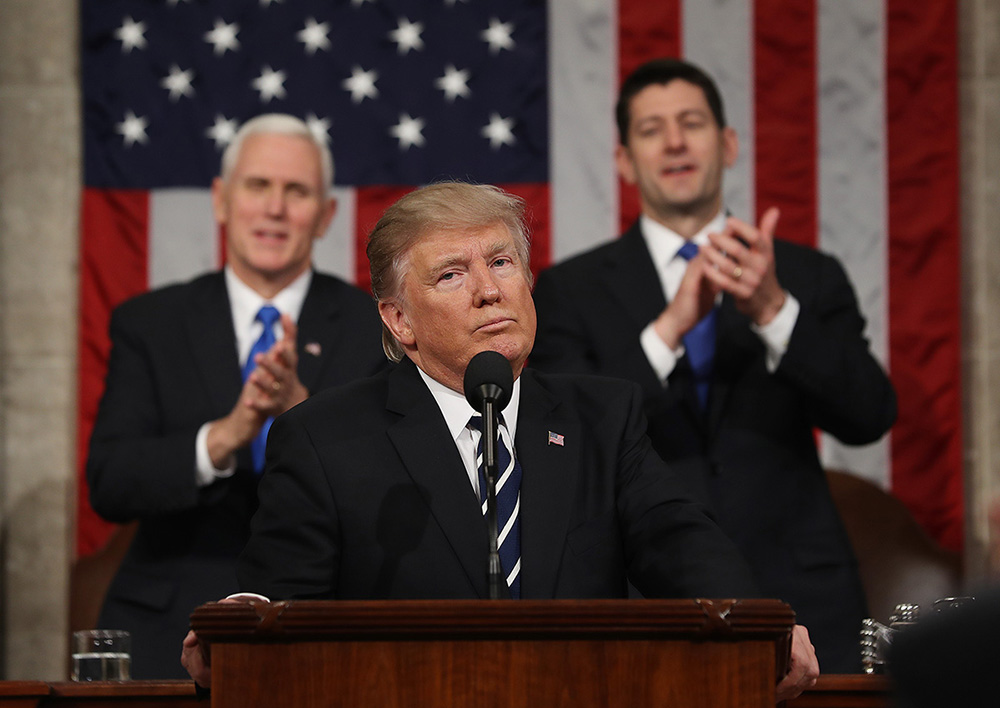By increasing competition in providing services, Trump can lower costs
People who watched President Trump’s address to Congress on Feb. 28 might have been forgiven for thinking Big Government was back in fashion, despite the Republican sweep of the White House and both chambers of Congress.
Trump said he would make health-care insurance — and health care itself — affordable; he would make inner cities a place for opportunity; he would boost infrastructure spending; and on and on.
Meanwhile, House Speaker Paul Ryan was sitting behind Trump, smiling and clapping, even though Ryan has always stood up for fiscal sobriety.
But Trump’s plans do not have to increase spending. Better education, health care and infrastructure can be achieved at a lower cost to the Treasury. A more competitive corporate tax code can attract businesses back, even to inner cities. And Trump has already proposed some cuts: The same day as his speech, he suggested cutting the State Department budget by 37%.
Of course, military spending, being in economic parlance a “public good,” is one of the few areas that spending would have to increase to get better results. But some former Army and Air Force officers I met this week from the University of Michigan’s Ross School of Business told me that there is room for more efficiency in the military as well.
Education
Let’s start with education. Trump wants to achieve higher standards through school choice, including public schools and charter schools. Competition raises the quality of the service without additional funds because lower-quality schools go out of business. Simply allowing the funding to follow the children to the schools that their parents choose will raise standards.
Competition in education has been shown to raise quality. In a study of charter schools in New York, Harvard professor Caroline Hoxby has shown the superior results of charter school education, accounting for the motivations of the parents. Going to a charter school from kindergarten through eighth grade closed the achievement gap between rich and poor students in mathematics, and eliminated two-thirds of the gap in English.
To see why, think of the service you get at an Apple Inc. AAPL, -0.24% store and the service you get at the Department of Motor Vehicles. You walk into an Apple store, and someone greets you with an iPad and asks how you can be helped. You are shown the product you want to buy, someone brings it and you can check out on the spot, without waiting in line for a cash register.
In contrast, at the Department of Motor Vehicles in Maryland, you take a number, sit down and wait. Then, after about half an hour, someone might see you. You often have to wait in another line to finish a simple task, such as registering a car or getting a driver’s license.
Apple knows it has to compete against other suppliers of computers and smartphones, and the late founder, Steve Jobs, insisted that the Apple store experience be carefully controlled to be what he considered optimum. The Department of Motor Vehicles has no competition. Former Indiana Gov. Mitch Daniels brought down waiting times at his Department of Motor Vehicles, but Maryland Gov. Larry Hogan and many of his peers have not been as successful.
Health care
The same can be done for health care. Health care is another area where it is practically impossible to shop around and compare prices because people rarely pay out of their own pockets. Good luck finding out how much it costs for surgery ahead of time, or even right afterward. The bills trickle in, and each is more surprising than the last.
The Affordable Care Act has exacerbated the problem by requiring a generous policy that includes mental health coverage, drug abuse coverage, unlimited lifetime coverage, pediatric dental care and maternity care — even for those without children who would prefer to buy a simple plan that insured against major problems and required the payment of routine expenses out of pocket.
Replacing Obamacare with a tax credit that allows people to shop around for health insurance and some health services would raise the quality and lower the price. As evidence, consider health services that are purchased directly by individuals who pay out of their own pockets, such as Lasik eye surgery and cosmetic surgery. Prices are clearly displayed and doctors advertise lower prices to attract patients.
Infrastructure
Finally, take infrastructure. In his book, “Crippled America,” Donald Trump wrote that giving $1 trillion to politicians for infrastructure spending is a recipe for disaster. The private sector frequently wants to invest in infrastructure, but is prevented from doing so by complex regulations, including environmental impact statements that can run to hundreds of pages.
We can learn from other countries. Airports can receive streams of private funding in the United Kingdom but not in the United States because U.K. airports are owned by private holding companies. Electric and diesel cars and trucks in New Zealand pay road user charges through “hubodometers,” which measure distance traveled and provide funding to build and maintain roads.
When people hear that the government will provide them with better service, they naturally think it will cost more money. Aside from the military, this does not have to be so. Better service does not have to mean a bigger budget.
This piece originally appeared on WSJ's MarketWatch
_____________________
Diana Furchtgott-Roth is a senior fellow and director of Economics21. She also served on the transition team for President Donald Trump. Follow her on Twitter here.
This piece originally appeared in WSJ's MarketWatch
